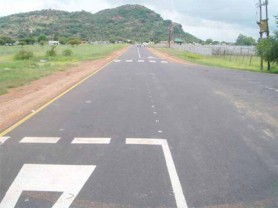Says polymer has proven its worth, can cut costs by up to 30%
Guyana is among several Caribbean countries being targeted for the application of new, less expensive road building technology which, according to the South African owner of the company that created the breakthrough, can significantly reduce road construction costs to developing countries.

Pieter Princeloo, Managing Director of the Johannesburg-based firm Romix, that created the technology, a Polymer-based adhesive that binds soils to create durable road foundations, told Stabroek Business that apart from the durability of the Polymer-based roads, the technology circumvents the need for expensive excavation work and the importation of high-cost construction materials to create firm sub-surfaces. “The technology allows us to complete road construction several times quicker than the conventional roads. Additionally, and as a rule of thumb, our costs are usually around 60 to 70 per cent of the cost of traditional roads. We are working with low grade material so we do not have to import a great deal of material into the layer works of the road. We are creating a single layer of road with the available materials instead of importing high cost materials. That is where the biggest savings accrue.”
And Princeloo told Stabroek Business that he would not rule out the possibility of enabling cheaper and easier access to the road-building material by Caribbean countries. “We are seeking to create factories all over the world as long as there is demand for the volumes,” Princeloo said.
The South African businessman told Stabroek Business that Romix was seeking to bring “a unique, 21st century technology into a developing environment and to prove to the authorities in Guyana that it is a sustainable way to create infrastructure quickly.” He said that apart from its affordability, the quality of the Polymer technology equals, even surpasses traditional road structures. “It is a simple process and we do not need to resort to specially graded material. We can improve marginal materials to make them become usable. We can also build a strong road in a single layer that will conform to conventional specifications,” Princeloo added.

“One of our primary aims is to take this technology to developing countries where road construction accounts for a significant share of public expenditure. The need for infrastructure in these countries is much greater than it is in the developed world. We guarantee speed of building, reliability and affordability, he added.
Princeloo explained that the Polymer technology which was researched and developed over ten years was designed to create foundations that were both durable and flexible. A six-inch layer of the Polymer adhesive is poured onto the soil where, according to Princeloo, it has the effect of migrating into and creating a binding effect. The road is then completed by pouring asphalt onto the hardened surface. He explained that the durability and flexibility of the material allows for the surface to remain particularly resistant to cracking.
Romix was established in 1996 and according to Princeloo the integrity of the Polymer technology had already been tested in about sixty countries. “Our successes are mainly in Africa; in South Africa, Kenya, Malawi, Ghana, Nigeria, and the Democratic Republic of the Congo. Polymer has also been applied In the Middle East. In Kuwait we have built roads on a foundation of desert sand which carries loads of up to upwards of 140 tons. That is far in excess of what some traditional roads carry,” Princeloo said. The Polymer technology has also been applied to road construction in India and China. He said that the Polymer was first used in road construction in Johannesburg in 1998 and that the road has ‘held up well with minimum maintenance” until now. Princeloo said that Romix had applied the technology on roads that service mines in South Africa and India which are required to carry loads far in excess of what traditional roads are designed to carry. “In those areas too we have had success”, he said.
In April last year Romix conducted a trial demonstration on a section of road in Trinidad and Tobago and Princeloo told Stabroek Business that the company is confident that the outcomes of those trials will help build confidence in the technology in the region.
Meanwhile, Princeloo told Stabroek Business that he was hoping to engage both public and private sector officials here since he believed that the Polymer technology could be usefully applied to the road construction sector here. He said that apart from the success which the technology has enjoyed in urban road construction, the material could prove particularly useful in the construction and maintenance of interior roads and could therefore be of particular benefit to the country’s mining, logging and farming communities since it circumvented the need for the creation of expensive foundations. According to Princeloo the application of the Polymer could also prove useful in effecting repairs to pot-holed surfaces in access roads to rural dwelling communities where budgets for road construction might be small. “We are hoping to bring this technology to Guyana where we believe that beyond the construction of roads it can also help to hasten development in other areas of the economy and physical infrastructure,” he added.


